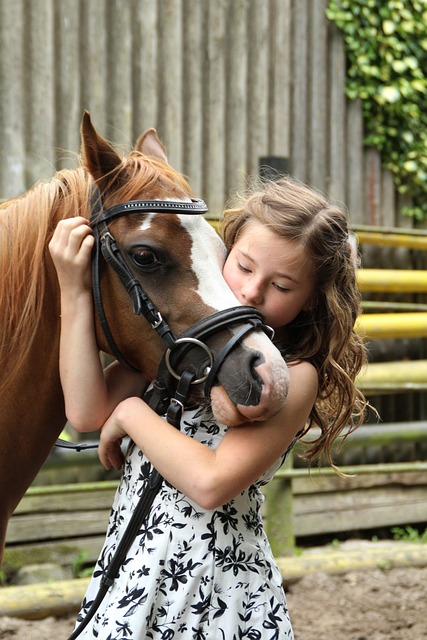Service animals have long been known for their ability to provide support and assistance to people with disabilities. While dogs are the most common type of service animal, another lesser-known but equally impactful service animal is the service horse. These incredible animals are making a significant difference in the lives of many individuals. In this blog post, we will explore how service horses are changing lives for people with disabilities, the benefits they offer, and real-life examples of their impact.

Understanding Service Horses
Service horses, also known as miniature horses, are trained to assist individuals with disabilities in a variety of ways. These small but mighty animals are typically around 24-34 inches tall and weigh between 70-100 pounds. Despite their size, they are strong, intelligent, and highly trainable, making them ideal service animals.
The Role of Service Horses
Service horses perform many of the same tasks as service dogs, including:
- Guiding the visually impaired: Service horses can help individuals who are blind or have low vision navigate their surroundings safely.
- Providing mobility assistance: These horses can help individuals with mobility impairments by providing physical support and stability.
- Alerting to medical conditions: Service horses can be trained to recognize and alert their handlers to medical conditions such as seizures or diabetic episodes.
- Emotional support: Service horses can provide comfort and companionship to individuals with mental health conditions such as PTSD or anxiety.
The Benefits of Service Horses
Service horses offer several unique benefits that make them particularly well-suited for certain individuals and situations. Some of these benefits include:
Longevity and Stamina
One of the key advantages of service horses is their longevity. Miniature horses have a lifespan of around 25-35 years, which is significantly longer than the average lifespan of service dogs. This means that individuals who rely on service horses may not need to go through the emotional and logistical challenges of transitioning to a new service animal as frequently.
Allergy-Friendly
For individuals with allergies to dogs, service horses can be a viable alternative. Horses have different types of dander and proteins than dogs, and some people who are allergic to dogs may not have the same reaction to horses.
Physical Strength
Despite their small size, service horses are incredibly strong and can provide substantial physical support. They can assist individuals with balance issues, help them stand up from a seated position, and even pull wheelchairs in some cases.
Non-Judgmental Companionship
The emotional bond between a service horse and its handler can be incredibly powerful. Service horses provide non-judgmental companionship and can help reduce feelings of isolation and loneliness. This emotional support can be particularly beneficial for individuals with mental health conditions.
Real-Life Examples of Service Horses in Action
The Story of Panda and Ann
One inspiring example of a service horse making a difference is the story of Panda, a miniature horse, and Ann Edie, who is blind. Panda has been trained to guide Ann in much the same way a guide dog would. Panda helps Ann navigate obstacles, avoid hazards, and find her way in unfamiliar environments. The bond between Panda and Ann is a testament to the incredible capabilities of service horses and the profound impact they can have on their handlers' lives.
Freckles and Michael's Journey
Another heartwarming example is the story of Freckles, a service horse, and Michael, a veteran with PTSD. Freckles provides Michael with emotional support, helping him manage his anxiety and cope with the challenges of daily life. The presence of Freckles has given Michael a renewed sense of purpose and companionship, highlighting the therapeutic benefits of service horses.
Actionable Tips for Considering a Service Horse
If you or someone you know is considering a service horse, here are some actionable tips to help you get started:
Research and Understand the Commitment
Before getting a service horse, it's essential to understand the commitment involved. Service horses require proper training, care, and maintenance. They need regular exercise, grooming, and veterinary care. Make sure you are prepared for the responsibilities that come with having a service horse.
Find a Reputable Training Program
It's crucial to work with a reputable training program that specializes in service horses. Look for programs with a track record of success and positive reviews from past clients. A well-trained service horse can make a significant difference in the quality of life for its handler.
Consider Your Living Situation
Service horses need space to move around and exercise. Consider whether your living situation is suitable for a miniature horse. If you live in an urban area, you may need to find nearby facilities where your service horse can get the exercise it needs.
Evaluate Compatibility
Not all service animals are a perfect fit for every individual. Spend time with potential service horses to evaluate compatibility. Make sure the horse's temperament and skills align with your needs and preferences.
Conclusion
Service horses are making a profound impact on the lives of people with disabilities. Their intelligence, strength, and longevity make them valuable companions and assistive animals. Whether providing physical support, guiding the visually impaired, or offering emotional companionship, service horses are changing lives in meaningful ways. By understanding the benefits and considerations involved in having a service horse, individuals can make informed decisions that lead to improved independence, well-being, and quality of life.
If you found this article informative and helpful, consider sharing it with others who might benefit from learning about the incredible work of service horses. Together, we can raise awareness and support for these amazing animals and the people they assist.